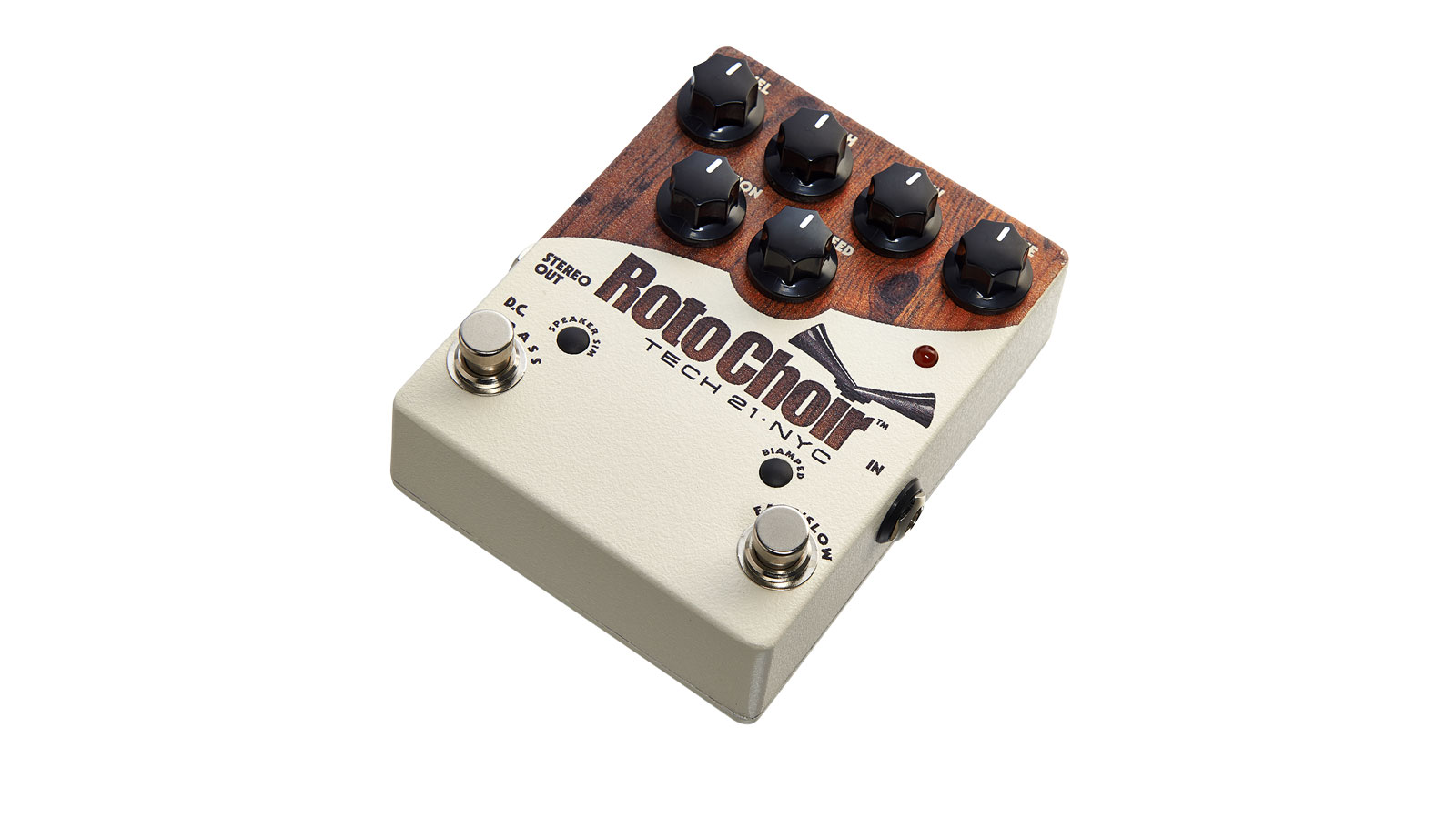MusicRadar Verdict
Classic rotary speaker simulation if you want it, but with the ability to push the boundaries.
Pros
- +
Fast/slow switch. Switchable between Leslie and vibratone sounds.
Cons
- -
No speed indication LED. The unattached battery cover could well go missing.
MusicRadar's got your back
The sound of a rotary speaker cabinet, originally designed as an adjunct to a Hammond organ, works equally well on guitar and has long had a place in rock and pop history.
Of course, being such a massive and heavy electro-mechanical contraption, the original Leslie cabinet was never going to become a popular choice with guitarists for onstage use.
"The RotoChoir presents all of its features to you up front with six knobs."
But attempts to recreate, or at least approximate, that swirling larger-than-life sound in a stompbox started back in the '60s with the likes of the Univibe. And it continues to this day with this new contender for the crown - the Tech 21 RotoChoir.
Build
Utilising a mix of analogue and digital technology, the Tech 21 RotoChoir can run from a 9V battery or alternatively from a standard BOSS-style power adaptor.
Like the Strymon Lex, the RotoChoir's two footswitches offer familiar bypass and fast/ slow functions, but where the Lex has its extra features hidden away, the RotoChoir presents it all to you up front via a set of six knobs and a pair of selector buttons.
A Level knob adjusts the overall output level while the drive, top speed and position knobs have similar functions to the Lex's preamp drive, fast rotor speed and mic distance.
Where the Lex has its bi-amp mode and its horn level knob, both of which can be used to move towards the sound of a Fender Vibratone or Leslie that just has a bottom rotor, the RotoChoir has a convenient bi-amped switch.
This either gives you the sound of a traditional Leslie 122 with the signal split between the top and bottom rotors, or the sound of a full-range bottom rotor asheard in a Leslie 125 or a Vibratone. Further variation is available in the RotoChoir with high and low active tone controls, offering both cut and boost, plus a speaker simulation switch.
This selects between a sound that Tech 21 says is "designed with inherently erratic and irregular peaks, valleys and notches to give you that familiar, unique raspy grind," and something that's a bit more neutral.
Sounds
The RotoChoir's emulation of a rotary speaker is convincing, but the overall sound is dependent on the two tone knobs. We assume that the 12 o'clock position is the most neutral, although there's no notch to mark the centre setting.
Both knobs have a lot of boost or cut on tap so as well as just tweaking the sound to taste it's possible to dial in something harsh and spiky. The drive knob, likewise, has a wide range of overdrive available through to a really full-on distortion.
The position knob for mic distance is also very effective, especially when yielding a very pronounced tremolo pulse at the closest-in position with the hugely convenient bi-amp switch calling up bottom rotor only.
Overall there are some familiar Leslie and Vibratone sounds on tap (the manual offers Badge, Angel and Cold Shot settings among others) with careful juxtaposition of the knobs, but there's also more extreme stuff if you want it.
There's no doubt that playing guitar through a rotary speaker will give you a multi-faceted sound with lots of subtle nuance that's a challenge to recreate using electronic rather than electro-mechanical means.
But recreate it we must if we don't want to be lugging huge cabinets around (not to mention mic'ing them up and servicing them regularly) and this pedal does the job extremely well.
The RotoChoir has a range of parameter values that can take the sound further away from the classic, though it's not always pleasant on the ear, so may appeal to more adventurous players.
As always, you pays your money and you takes your choice, but this will provide you with a practical means of joining the rotary club.
Trevor Curwen has played guitar for several decades – he's also mimed it on the UK's Top of the Pops. Much of his working life, though, has been spent behind the mixing desk, during which time he has built up a solid collection of the guitars, amps and pedals needed to cover just about any studio session. He writes pedal reviews for Guitarist and has contributed to Total Guitar, MusicRadar and Future Music among others.
“If they were ever going to do the story of Nero, probably the most decadent of all the emperors, they would have to use Roy Thomas Baker”: A tribute to the legendary producer of Queen, Alice Cooper, Journey and more
“Built from the same sacred stash of NOS silicon transistors and germanium diodes, giving it the soul – and snarl – of the original”: An octave-fuzz cult classic returns as Jam Pedals resurrects the Octaurus
What’s the buzz? Meet Yellowjacket, Cherry Audio's recreation of EDP’s trend-setting Wasp from 1978











